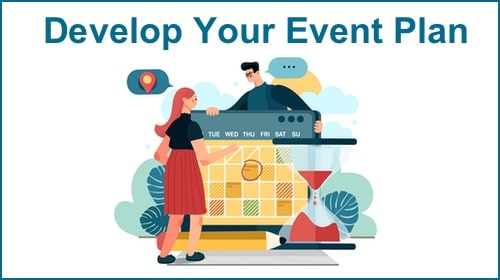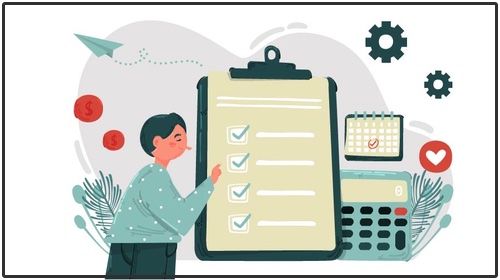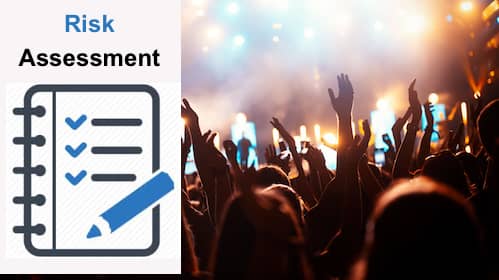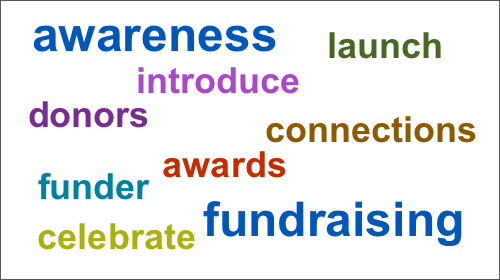Events: Step by Step
Planning is the key to executing a well organised, enjoyable, and successful event.
Authored by: iClick2Learn Team
Translate Text
Table of Contents
Introduction
You’ve decided to run an event for your organisation and want it to be successful as possible. If you haven’t already defined a purpose for your event, this is your first step. To help define your event’s purpose read our article, The Purpose of Your Event.
Once you have defined your purpose and the type of event you want to run, it’s time to start planning.
Whether you have run many events in the past or this is your first time, planning is essential. Planning is the key to executing a well organised, enjoyable, and successful event.
In this article, we will explore how to run a successful event for your organisation in three main stages: planning, execution, and evaluation.
Planning
Set a date
The first step is to set a date. You don’t need to lock it in just yet, but you’ll need at least a tentative date to get the ball rolling.
When thinking about dates, do some research to make sure your event doesn’t clash with any other local events. Also take the weather, public and school holidays, into consideration.
Once you have a tentative date start asking your members and volunteers if they are available on that date. Also start making enquiries into availability of venues.
Budget
Create a budget. Work out how much you have to spend, then list fixed costs and forecasted revenue. Be conservative when forecasting how much money your event will make.
If you spend a large amount of money, then you don’t sell as many tickets/items as you thought, your organisation might end up losing money.
Some costs to consider are:
- Venue hire
- Equipment hire
- Merchandise
- Paid staff
- Insurance
- Printing/office expenses
- Catering
- Marketing and promotion
- Miscellaneous costs
Venue
Once you have your date and budget locked in, you can book your venue. Visit the venue in person and talk to the manager to ensure it caters to all your needs. Get a written quote so there are no nasty surprises when you get the final bill.
Volunteers
Create a list of all the roles you’ll need help with during the event. Circulate the list with your members and volunteers, and ask them to nominate roles they are interested in. Ask people for their contact details, so you can stay in touch.
Some roles you might need for your event are:
Before the event
- Marketing and promotion
- Tickets – selling tickets online and in person
- Volunteer coordinator
- Event planner
- Communication – people to answer phone calls and emails regarding the event
During the event
- Set up – setting up the venue
- Registration – checking tickets/registrations
- Welcome – welcoming attendees
- Ambassadors – members of your organisation who can explain what the event is for, what your organisation does, and how people can become members or get involved.
- Food and beverage – assist with the catering/drinks/tea or coffee. If serving alcohol, make sure you comply with relevant legislation such as Responsible Service of Alcohol.
- Technical support – if you will be using a projector, PA system, microphone, computer system or any other type of technical equipment, have someone with technical expertise there to help you
- Pack up
- Rubbish removal
Agenda
Create an agenda and timeline of how the event will run. Include names of people responsible for each task, so everyone is clear on who’s doing what.
Risk Management
It’s important to consider all the risks when holding an event. Create a risk management plan that: identifies possible risks, how to minimise risks, and what to do if a risk occurs.
Some risks to consider are:
- Damage to equipment, infrastructure or event site
- Accidents or injuries
- Legal
- Financial
- Strategic
- Natural disasters
- Reputational damage
Permits, contracts and licenses
Make sure you have a written agreement or contract with any 3rd party contractors, vendors, or staff. This includes your venue.
Research if you need any special permits or licenses for the type of event you are holding. For example, responsible service of alcohol, mobile food serving, working with children check, council permits.
Insurance
At a minimum you should have public liability insurance. You might also want to consider volunteer and equipment insurance.
If in doubt of what type of insurance you require, contact a professional for advice.
Contingency plan
Things can and do, go wrong. Which is why it’s good to have a contingency plan. This might be as simple as having a wet weather plan, if your event is outside.
Registration/tickets
If you’re selling tickets to your event, now’s the time to start selling. The more tickets you can sell in advance, the more confident you will be about the financial success of your event.
There are some great platforms to sell tickets online. Also plan to sell tickets in person and at the door, as not everyone likes to purchase online.
Marketing
You’ve planned a well thought out event. The venue’s book, volunteers organised and an agenda created. Now you need to tell your community about it and why they should attend.
Marketing can take many forms, including:
- Word of mouth
- Social media
- Newspaper article and advertising
- Radio interviews and advertising
- Posters and flyers
Execution
You’ve spent weeks, maybe months, planning your event, and now the date is finally here. With all your planning and hard work, your event should run smoothly.
That doesn’t mean you can take your hands off the wheel.
Check your phone and emails regularly for any last minute changes or cancellations. Have one or two people roaming the event, to identify any problems quickly.
Refer to your agenda regularly to ensure events are running to schedule.
And most importantly, have fun and make sure other volunteers and attendees are enjoying themselves too.
Evaluation
Now your event is finished, it’s time to evaluate if you achieved your purpose.
Evaluation can take many forms.
- Comparing final numbers to your forecasted budget.
- Number of attendees
- Formal and informal feedback – from volunteers and attendees
- How effective was your marketing
- Return on investment – soft (intangible) and hard (tangible) benefits
Once you have looked at all of this information, you can work out if your event achieved the purpose it was designed to – fund raising, awareness, community engagement, or another purpose.
Conclusion
Holding an event can be time consuming and hard work. But they can also be rewarding and beneficial for your organisation. Remember, define the purpose of your event, plan, plan, plan, and have fun!
Related posts
- Tags | Events









